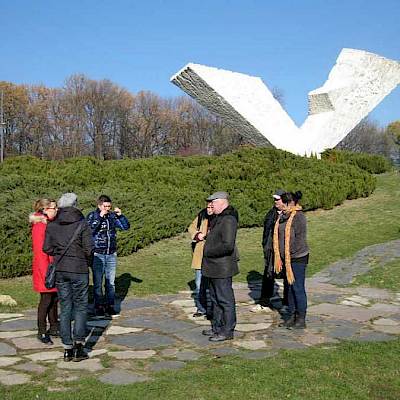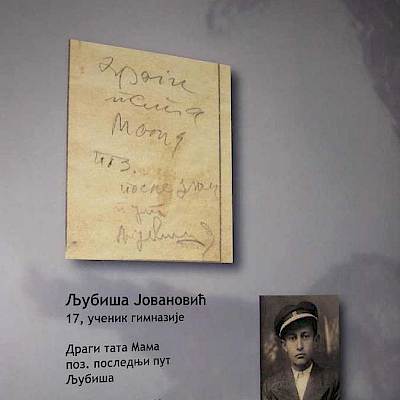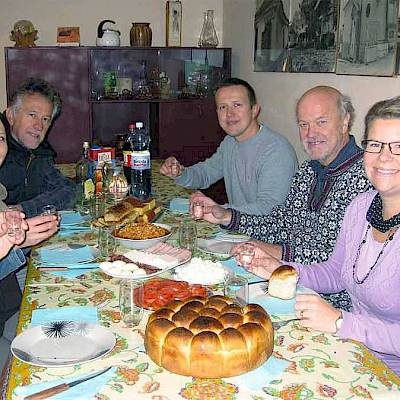Kragujevac 1941 and today - from the Swedish point of view
A couple of years ago, we were invited by the Swedish embassy to come to Belgrade, Serbia, to give a workshop on Historic Environment Education and how to work with time travel and social issues. We then made a trip back in time to the 1400s and the encounter between Muslims and Christians in a Fort in central Belgrade. After the workshop they wanted to continue working with the methodology and with funding from the Swedish Institute there is an ongoing collaboration. The last time travel was about discrimination and took place in 1941 when the question of Jews and Roma would register was current.
Yesterday, we met young people who have been involved in time travel and heard their reflections on what they learned by seeing things from someone else's perspective, as they were doing in the time travel. The young people were wise and had uplifting thoughts and they think that discrimination is an important social issue to work on, as well as democracy, gender, religion, and how to get young educated people to stay in Serbia.
We have also been in Knjazevac and looked at the museum, a Roman fort and an archaeological park and discussed how to work with these sites. The keyquestion they want to work with in Knjazevac is fear.
It is grim to go in Serbia today and many people express pessimism about the future. However, it feels hopeful when we meet the young people and dedicated persons that we work with, in the middle of a problematic everyday is a power and will to change!
Today we were having intensive discussions about history, cultural heritage and its influence on the future. We were in Kragujevac, a town south of Belgrade. On 21 October 1941, something horrific happened here, close to 3,000 of the inhabitants were gathered together and shot by German soldiers, according to the principle for one killed German soldier, hundred civilians were killed. Those executed were ordinary workers, travelers, teachers, and even a couple of classes with pupils. Before they were executed they were held captive for two days and many of them wrote greetings to their loved ones on small pieces of paper, and these are now preserved. Today there is a great museum and a memorial park in the city. On 21 October there is a big remembrance ceremony with several thousand participants each year. The city is weighted down of its history as well as the rest of Serbia, the people we meet are talking a lot about fear, that they are victims of the wars that have been and that the political system is not functioning properly.
This past year there have been new educational programs at the Museum in Kragujevac with the intention that you should learn from what has been but also use that knowledge to create a better future. Here we from Kalmar come in, they want to create an event of the memorial that not only relives the horror but also is looking forward. Kalmar county museum feels like our partners in Serbia has great confidence in us, that they want us to be involved and work out the plans. Our role is much to add an outsider's perspective, asking questions, what is really Serbia's identity? How can you use all the negative history for a better future? You can talk about 1941, but do you dare to talk about the Balkan wars of the 1990-2000's which sat bitter scars?
The event will take place in March next year with youth and others from the city.
Last night we ate dinner at one of our partners place, we ate Indonesian food in a small apartment in Belgrade with journalists, historians and cultural workers. Sometimes it feels like the whole world can be accommodated in a small apartment! This job truly creates meetings and new friends! Suddenly, the Balkan conflicts are also important for me, something I have not considered previously if I'll be completely honest!
Emma Angelin-Holmén, Kalmar County Museum
- Canada
- Estonia
- Finland
- Iceland
- Ireland
- Italy
- Kenya
- Latvia
- Lithuania
- Nicaragua
- Serbia
- Questioning War and Peace while Celebrating Gods:
- Commemoration, forgiveness and manifest for the future: Time Travel event in Kragujevac, Serbia
- Kragujevac 1941 and today - from the Swedish point of view
- Human Rights and Tolerance; Time Travel project in Serbia
- Tolerance and Diversity, We and the Others
- Report from the Museum Outreach Time Travel Workshop
- Museums and Community Outreach Work, Workshop in Belgrade 16-17 September 2011
- South Africa
- Sweden
- Tanzania
- Turkey
- Uganda
- USA
- Åland Islands
- Brazil





